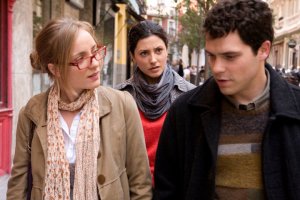Monday, October 25, 2010
Easy Cap Multiviewer For Vista
On Friday, November 22, was held in Antequera Bioethics course for doctors of Andalusia, organized by the Bioethics Working Group of the English Society of Intensive Care Medicine, Critical and Coronary Units (SEMICYUC ), and coordinated by Dr. Jose Arias and Dr Antonio Rodriguez Zarallo, which have involved several speakers who belong to the ICU of Hospital de Jerez.
various topics were reviewed in Bioethics Ethics Committees as presented by Dr. Jose Arias (Master in Bioethics). Dr. Angel Estella (Master in Bioethics) discussed the management of resources and difficult decisions, while Dr Rafael Bohollo (Expert on Bioethics and Biolaw) addressed current issues such as informed consent, Wills and Advance Vital conscientious objection. Dr. Antonio Rodriguez Zarallo (Master in Bioethics) elaborated on the Limitation of therapeutic effort, futility and therapeutic cruelty. Finally, Dr Francisco Carrizosa (Hospital Transplant Coordinator Sherry) revised the diagnosis of brain death and organ donation.
Tuesday, October 19, 2010
24/7 Walk-in Clinic Toronto
In
post last Tuesday, David Muñoz spoke of "Through Stranger Eyes" by David Brin, who analyzed "ideologically" some narrative structures, especially Myth of the Hero,  discussed in "The Hero with a Thousand Faces " by Joseph Campbell, and charged that behind this narrative paradigm could be found ideas "fascist," a glorification of aristocracy, etc. Soil
discussed in "The Hero with a Thousand Faces " by Joseph Campbell, and charged that behind this narrative paradigm could be found ideas "fascist," a glorification of aristocracy, etc. Soil
get to shake every time someone looks at movies or series from the ideological point of view: it is like sitting in front of a commissioner who reviews the work of one, judging solely as politically effective or not. But I also think, as David in his post
, the writers make decisions instinctive in our scripts, never suspecting any political or ideological interpretations they may have. I would like to take a moment to consider this matter. I promise it will be less heavy than it seems. Take American commercial film studio. (A movie that will or will try to be) a great success. Here are some features that tend to recur with some frequency.
1 A hero (usually a man). Ordinary guy: smart, but not overly religious, good, but not a saint ready, but not a genius.  2 faces external constraints. Contrary to what many others would do in your situation, the hero decides to tackle the problem. He does it his way. Many times the decision leads him to confront the group who does not understand their rebellion.
2 faces external constraints. Contrary to what many others would do in your situation, the hero decides to tackle the problem. He does it his way. Many times the decision leads him to confront the group who does not understand their rebellion.
4 Thanks to their efforts, applying the teachings of the master and overcome their weaknesses, the protagonist manages to overcome the problem, conflict.
5 After this happy ending, the hero returns to the initial situation ... improved. Now is best known to himself, as he has learned something. Society, in gratitude, we also have more consideration: it's a little more that an ordinary guy. Moreover, its success comes from some form of secondary success (success sentimental and / or economic).(I have extracted these general features of my experience as a film viewer. Surely I've left a few. Many of them coincide with the stages of the hero myth. It is not unusual, as this narrative paradigm has become the mold which are made by almost all commercial films. Obviously, there are many cases in which the scripts do not meet all these points. For example, it is very common for the modern hero is ... an anti-hero who does not achieve total victory or social insertion satisfactory even after success).
We step.
What ideological consequences can be drawn from these points? Item 1
- We are alone. The society is a group of individuals. - What's hot is normal, to quote Dante is rare. Do not make no sport is rare. Much care is rare. Do not care nothing is rare. There is an average. That's what's cool. There is the hero. The extraordinary thing is hidden in the ordinary. Item 2
- There are mystical forces, inner powers ... the reality is not only known through the senses and reason. There is something else. And faith is the door.
Item 5 - The best way to get social recognition is ... separate from the company, perform some act of rebellion.
- Individual success often means social recognition, emotional and economic.
In short, the commercial cinema of Hollywood, which continues to this type of scheme indent to emphasize is basically a thesis that could be summarized as follows: an ordinary person can overcome any obstacle if you work inside and find some inner strength . Do not expect much help from society. Stop believing in yourself is the way to defeat. Indeed, victory and defeat are clearly distinguishable.
As you see, basically, the commercial cinema of Hollywood, usually using the paradigm of the hero myth, conveys more traditional American values: individualism, meritocracy, successful search, the exaltation of work, of education as something very practical and somewhat "rebellious" constructive, belief in the existence of "supernatural forces" (religions, the forces of nature, ancient traditions) and a vision optimistic that invites trust in the inevitable triumph of truth and justice.
Personally, I share many of these values \u200b\u200b(but not all) and I imagine many of you (though perhaps not ye stop to think too much about it) you think of something.
Should commercial film success to it, it connects to the shared values most of the public o. .. have these values \u200b\u200bbecause the public has been indoctrinated for years by a fiction that sought to impose?
Tuesday, October 12, 2010
Monday, October 11, 2010
Brampton Black Hairdresser

Wednesday, October 6, 2010
Blackberry Sim Cards In India
This morning I set foot on the coffee table and a movie on DVD. He was a French thriller from the seventies that a friend had happened to me and recommended: "
Police Python 357", the recently deceased
Alain Corneau, starring actor and singer Yves Montand
.
 acknowledge
acknowledge at first I was a bit boring. Frequently looked the DVD counter, waiting for what began to interest me. They spent a lot of things, but I just imported a lot. For those who have not seen and do not think so, I summarize the argument slightly. (Since there are spoilers here - by the way, one has to warn of a dangerous espoilers seventies?)
Montand is a tough cop in the city of Orleans. His boss, Commissioner Ganay, is married to a paralyzed woman, played by Simone Signoret
. Montand meets an Italian (Stefania Sandrelli
) something mysterious with it rewinds. Their relationship is quite turbulent. This was the part where I was watching the DVD counter. I was bored. The girl was unbearable. A couple of surprises come when, we learn that the Italian is also a lover of the protagonist's head and say that this is topically French, the wife of the head, the paralytic, knows all about this relationship with her husband and seems to approve absolutely. Suddenly, when we were in minute 30 (to the delight of the script writers of manuals), the lover wants to break with the commissioner Ganay to be only with the protagonist. Ganay, surprisingly, he takes it pretty well. As well, reproaches her lover his passivity and lack of passion. Provokes So the guy just kill her. 30 min. Ganay
 flees the scene of the crime. Soon after, shocked, comes home. Simone Signoret, paralyzed wife asks him what happened. Ganay answers with brief explanations: I've beaten, with an ashtray. What have you done with him? I've thrown in the river ... The commissioner is sunk. Women, as usual, lying in bed, seems quiet. She tells her husband, imperative tone, to take a cushion. Ganay looking for a moment the room. His wife complains: no, the pad is in a dresser drawer. Ganay find it eventually. The wife tells you to stop beside her in bed, and support head on it. Ganay obeys. Placed next to it and go to talk about what to do thereafter. She keeps a cool head, he goes slowly reassuring: no, not going to surrender.
flees the scene of the crime. Soon after, shocked, comes home. Simone Signoret, paralyzed wife asks him what happened. Ganay answers with brief explanations: I've beaten, with an ashtray. What have you done with him? I've thrown in the river ... The commissioner is sunk. Women, as usual, lying in bed, seems quiet. She tells her husband, imperative tone, to take a cushion. Ganay looking for a moment the room. His wife complains: no, the pad is in a dresser drawer. Ganay find it eventually. The wife tells you to stop beside her in bed, and support head on it. Ganay obeys. Placed next to it and go to talk about what to do thereafter. She keeps a cool head, he goes slowly reassuring: no, not going to surrender. The film follows. Lasts 120 minutes with another great turning point in minute 90 (yes, everything seems to magically fit into the scheme of screenwriting manuals) I recommend you to see (by the way, I feel great remake meat). However, of which I wanted to talk about is the sequence of Ganay and his wife, which I have described.
 My question is ...
My question is ... What does it look damn pad there?
Yes, that's my question. A guy comes home after being charged with her lover. Not sure whether delivered or not. It is a dramatic moment. Why the hell put Corneau and Boulanger, his co-writer for a moment in which the woman tells her husband to take out a pad comfortable? Was an occurrence of the filming? Maybe, but ... why not eliminate Corneau in the assembly? Do not break the tension of the scene that moment of everyday? Could not lie down without cushion husband? Could not be the cushion and on the bed to avoid boring and anticlimactic that second in which the murderer he seeks, with some awkwardness?
These pauses or digressions can break the rhythm or bore the viewer, but also achieve it creates what you see. Often the writers
eliminate everything that is not important or essential to the plot. However, at times, be so strict, awarded to every sentence they utter and every action that people perform a strict order is in some way, to eliminate a certain possibility of identification and realism.
In reality, in life, when one returns home and begins to tell his wife that is to commit a murder, we all know from experience at home is seen, is the birthday of the child and that is full of screaming dwarf, or a woman complains that it spoils the quilt (are crushed feathers) or, after the crime, you forgot to pass through the supermarket (at this time have already closed). In life no longer pitch changes happen, unwarranted digressions, jokes, grotesque in dire situations, endless discussions, dialogues inconsistent and many times killed. When writing stories because we know that we usually remove the stories are not life but ... the stories are about life. The question as always ... how many lives we let into our stories? In your movie, look for the murderer that damn pad?
 . To me yes, of course.
. To me yes, of course.